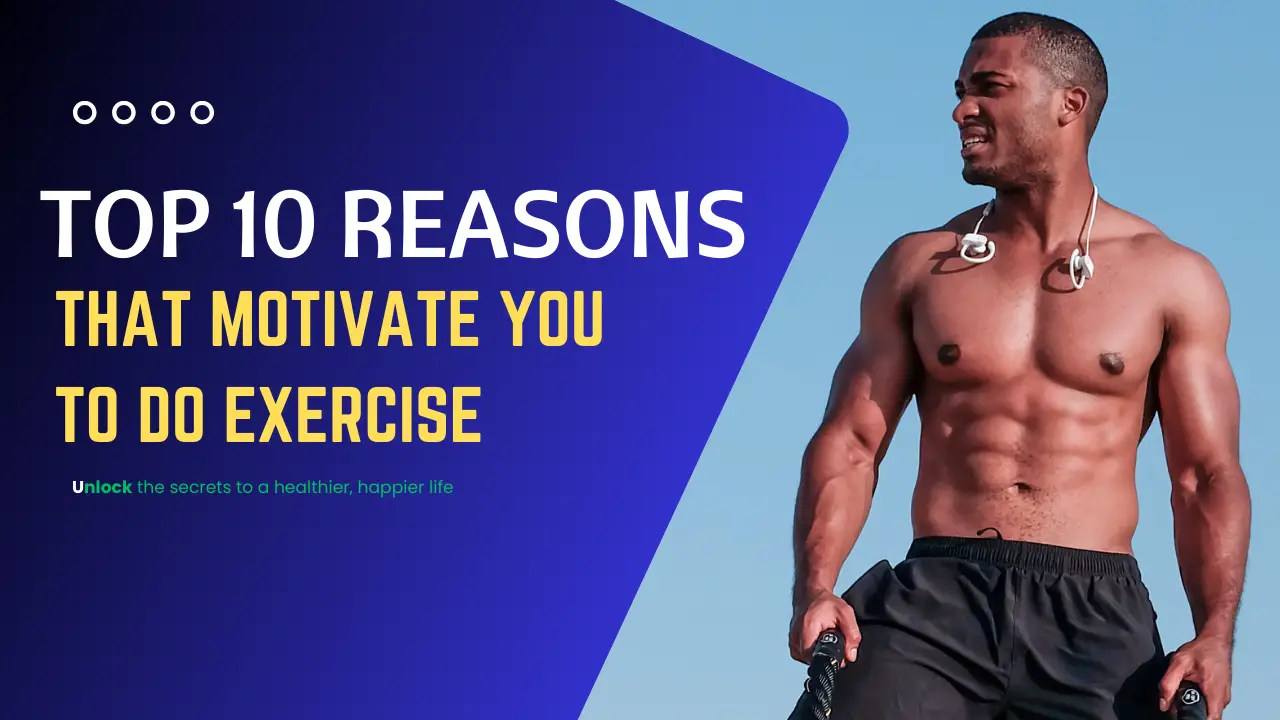10 Reasons That Motivate You to Do Exercise: A Comprehensive Guide
Table of Contents
Unlock the secrets to a healthier, happier life with our comprehensive guide to exercise motivation. Discover the top 10 reasons to embrace physical activity, along with practical tips for staying consistent, overcoming obstacles, and achieving your fitness goals. From enhanced physical health to improved mental well-being, find out how exercise can transform your life. If you’re ready to prioritize your health and well-being, dive into our expert advice today!
Introduction: Unveiling the Power of Exercise
In a world dominated by sedentary lifestyles and digital distractions, the importance of regular exercise cannot be overstated. From boosting physical health to enhancing mental well-being, engaging in physical activity offers a multitude of benefits that transcend mere physical appearance. In this comprehensive guide, we delve into the top 10 reasons that serve as powerful motivators for incorporating exercise into your daily routine.
1. Enhanced Physical Health

Regular exercise is the cornerstone of a healthy lifestyle, offering a myriad of benefits for physical health. From improving cardiovascular function to enhancing muscle strength and flexibility, engaging in physical activity contributes to overall well-being and longevity.
2. Weight Management
For individuals aiming to maintain or achieve a healthy weight, exercise is indispensable. By burning calories and boosting metabolism, physical activity plays a pivotal role in weight management and preventing obesity-related health issues.
3. Mental Clarity and Cognitive Function
Beyond its physical benefits, exercise is renowned for its positive impact on mental health and cognitive function. Regular physical activity has been linked to reduced stress levels, improved mood, and enhanced cognitive abilities, including memory and concentration.
4. Stress Relief

In today’s fast-paced world, stress has become an inevitable part of daily life. Fortunately, exercise provides a natural and effective outlet for stress relief. Engaging in physical activity prompts the release of endorphins, neurotransmitters known for their ability to alleviate stress and promote feelings of well-being.
5. Boosted Immune System

Maintaining a strong immune system is crucial for warding off illness and disease. Regular exercise has been shown to enhance immune function by promoting better circulation, reducing inflammation, and supporting the production of immune cells, thus reducing the risk of infections and illness.
6. Increased Energy Levels
Contrary to popular belief, engaging in physical activity does not deplete energy; rather, it replenishes it. Regular exercise boosts energy levels by improving circulation, enhancing oxygen delivery to tissues, and promoting better sleep, resulting in increased vitality and stamina throughout the day.
7. Improved Sleep Quality
Quality sleep is essential for overall health and well-being, yet many struggle with insomnia and sleep disorders. Incorporating exercise into your routine can significantly improve sleep quality by promoting relaxation, reducing stress, and regulating sleep-wake cycles, leading to more restful and rejuvenating sleep.
8. Enhanced Self-Esteem and Confidence
The physical and mental benefits of exercise extend beyond mere health outcomes; they also impact self-esteem and confidence. Achieving fitness goals, overcoming challenges, and witnessing improvements in physical appearance all contribute to a positive self-image and greater self-assurance.
9. Social Connections and Community

For many, exercise serves as a social activity, fostering connections and camaraderie with like-minded individuals. Whether through group fitness classes, team sports, or outdoor activities, engaging in physical activity provides opportunities to bond with others and cultivate a sense of community.
10. Longevity and Quality of Life
Ultimately, the cumulative effects of regular exercise translate into a longer, healthier life. By reducing the risk of chronic diseases, improving overall health, and enhancing quality of life, physical activity is one of the most powerful tools for promoting longevity and well-being.
Conclusion:
In conclusion, the myriad benefits of exercise underscore its importance as a cornerstone of a healthy lifestyle. From improving physical health and mental well-being to enhancing quality of life and fostering social connections, physical activity offers something for everyone. By making exercise a priority in your daily routine, you can unlock the full potential of your body and mind, leading to a happier, healthier, and more fulfilling life.
FAQ’S
Q: How often should I exercise?
A: The frequency of exercise depends on individual goals and fitness levels. Generally, adults should aim for at least 150 minutes of moderate-intensity aerobic activity or 75 minutes of vigorous-intensity activity per week, along with muscle-strengthening activities on two or more days a week.
Q: What types of exercises should I do?
A: It’s important to include a variety of exercises in your routine to target different muscle groups and aspects of fitness. This can include aerobic exercises like walking, running, swimming, and cycling, as well as strength training, flexibility exercises, and balance exercises.
Q: How long should my exercise sessions be?
A: The duration of exercise sessions can vary depending on your fitness level and goals. For cardiovascular workouts, aim for sessions lasting 30 minutes to an hour. Strength training sessions can range from 20 to 60 minutes, depending on the exercises and intensity.
Q: Is it better to exercise in the morning or evening?
A: The best time to exercise is whenever you can fit it into your schedule and when you feel most energized and motivated. Some people prefer morning workouts to kickstart their day, while others prefer evening workouts to relieve stress and unwind.
Q: Can I exercise if I have a medical condition?
A: In many cases, exercise can be beneficial for managing and improving certain medical conditions. However, it’s important to consult with a healthcare professional before starting any new exercise regimen, especially if you have pre-existing health concerns or medical conditions.
Q: How do I stay motivated to exercise regularly?
A: Staying motivated to exercise can be challenging, but setting realistic goals, finding activities you enjoy, varying your routine, and exercising with a friend or group can help maintain motivation. Additionally, tracking your progress and celebrating your achievements along the way can keep you motivated.
Q: What should I eat before and after exercising?
A: Eating a balanced meal or snack containing carbohydrates, protein, and healthy fats before exercise can provide energy and support muscle function. After exercise, consuming a combination of carbohydrates and protein can help replenish energy stores and promote muscle recovery.
Q: Can I lose weight just by exercising?
A: While exercise is an important component of weight loss, it’s also essential to maintain a healthy diet and lifestyle. Weight loss occurs when you burn more calories than you consume, so combining regular exercise with a balanced diet is key to achieving and maintaining a healthy weight.
Q: How do I prevent injuries while exercising?
A: To prevent injuries, it’s important to warm up before exercising, use proper form and technique, gradually increase intensity and duration, listen to your body, and incorporate rest days into your routine. Additionally, wearing appropriate footwear and using proper equipment can help reduce the risk of injury.
Q: Can I exercise during pregnancy?
A: In most cases, exercise is safe and beneficial during pregnancy, but it’s important to consult with a healthcare provider before starting or continuing any exercise regimen. Low-impact activities like walking, swimming, and prenatal yoga are generally recommended, while high-impact or contact sports should be avoided.
These FAQs cover some common questions about exercise, but if you have specific concerns or questions, it’s always best to consult with a qualified fitness professional or healthcare provider for personalized guidance and advice.
Share this content:




Post Comment